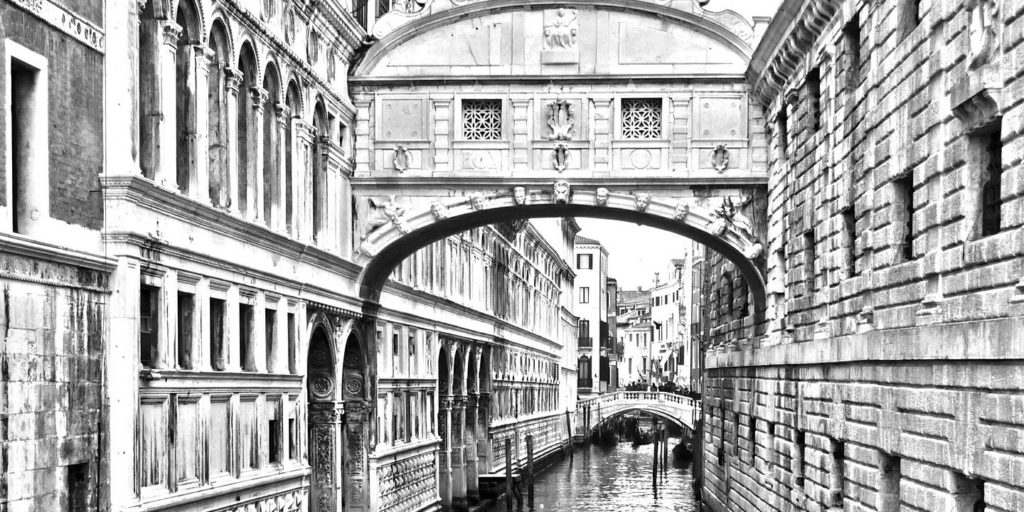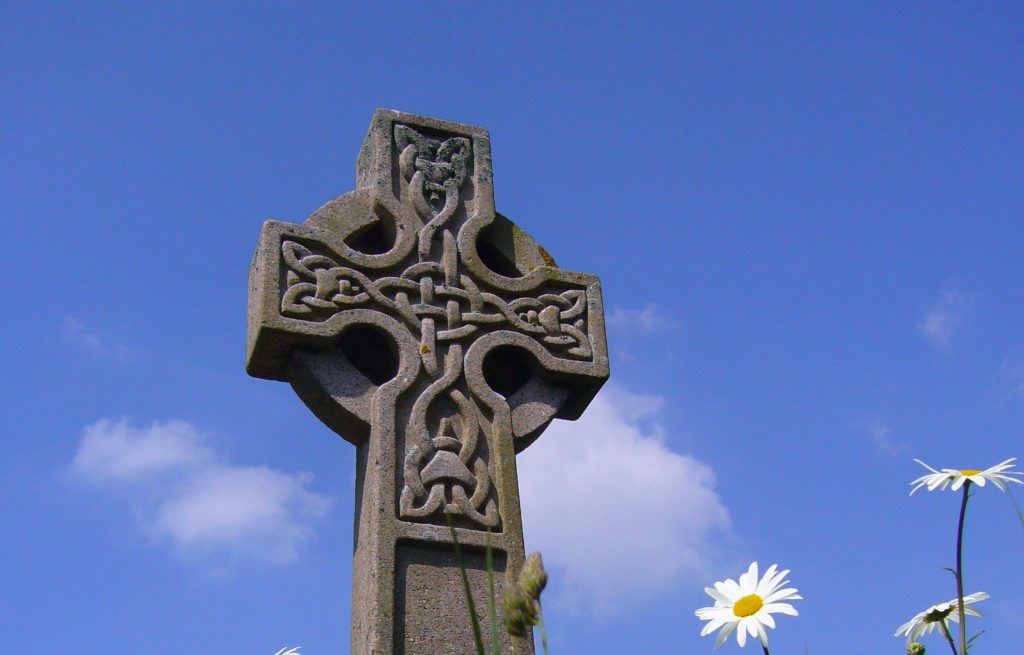It was 1997. I was twenty-two, and back from university with a degree in what might as well have been Klingon. I was reading Sartre, and very pleased with myself. I wrote to all of the northern regional newspapers asking whether I could do work experience. To my surprise, my local paper, which I’ll call the Cleveland Herald, wrote back. They’d take me on as a trainee reporter. They’d even pay me. I was made up, as the Scousers say.
Now a writer, I urgently required a garret. I said goodbye once again to my parents and moved into my first flat, a crumbling bedsit overlooking the North Sea in Saltburn-by-the-Sea. I used a cardboard-reinforced brown suitcase I found in the loft. It’d belonged to my dad. It still wore a yellowed ticket with his name, address, and the year 1969.
Saltburn was a thirty-minute train ride from Middlesbrough town centre, where the Cleveland Herald was put together and printed in an old granite building, one of a row in a part of Middlesbrough which spoke of old boom and ore, and, once upon a time, money. The county archives were next door. The other neighbour was an old-fashioned-looking legal firm.
On the first morning, I walked into reception, introduced myself, and was told to sit and wait. Before me was a table with a spread of newspapers. They were in a pleasing pattern which I chose not to disrupt. My shirt collar was a bit tight. A battered lift door screeched open. Out walked a plump girl of about my age in a tartan skirt-suit.
‘Mr Walsh?’ she asked. I stood and offered my hand. She barely touched it.
‘I’m Chris,’ I said.
‘Mr McIntyre will see you,’ she said. ‘Follow me.’
We got into the cramped lift, and the old door limped shut.
‘Which section do you work in?’ I asked.
‘Features,’ she said. I wasn’t sure what that was. Something important, by the sounds of it. I wanted a cigarette. The lift delivered us to the second floor. I was led across an office teeming with people, most either staring at computer screens or on the phone. ‘This is where I started,’ she said, pointing at a section; ‘Advertising.’
‘It’s nice,’ I said.
She shot a quizzical glance.
‘I mean…’ I started, but she was off.
‘This is the Sports Desk,’ she said. A young man saluted me. ‘Here’s Features,’ she said. No-one looked up. We moved on. ‘Circulation and Admin,’ she said. ‘You’ll probably start here. Editorial in there.’ She pointed at an open door. ‘Don’t go in there unless they call you.’
I was uncomfortable in my own skin. My instinct was to bolt. Get on the train. Find my bed. Or better still, pick up a good book, spend the day in a pub. Soon we were stood outside the Editor’s office. She knocked.
‘Come,’ issued a muffled voice. She opened the door. Cigar smoke. It was a wood-panelled office. An old man with white swept-back hair was seated behind a huge table supporting a sea of paper. I noticed he held a pen in his left hand.
‘Thanks, Kayleigh,’ said the man, holding up his other hand, but not looking up.
‘My pleasure, Mr McIntyre!’ sang Kayleigh. She looked daggers at me, and left.
‘I’ll be with you in just a minute,’ said McIntyre, in a thick Scots brogue.
‘That’s fine,’ I said.
He looked up. I froze. After regarding me, he picked up a smouldering cigar from a hulking crystal ashtray, took a puff, put it back, and carried on writing. I dearly wanted a cigarette. At last, McIntyre put down the pen, pushed away the paper, and sat up.
‘I’m Chris,’ I said.
He leaned back in his leather chair. ‘And I’m The Editor,’ he said.
‘Thanks for having me,’ I cringed.
‘I can already see you have the necessary arrogance, Chris,’ he smiled.
‘I’m sorry… if I…’
‘Journalists are arrogant,’ he said. ‘I’ve met enough young men in my time to see that you fit the bill.’ And then he added, ‘In this regard.’
I didn’t think of myself as arrogant.
‘In other regards,’ he continued, ‘we don’t yet know.’ He took another puff, and watched me.
‘I’d like a cigarette,’ I said. It was like Tourette’s. McIntyre chuckled. ‘I’m sorry,’ I said.
‘I’ve learned something else about you,’ said McIntyre. ‘You are impatient. You cannot defer gratification. Am I correct?’ I looked at the floor. ‘So,’ he said. ‘I know that you are arrogant. And I know that you are impatient. These can be two excellent journalistic attributes.’ Was he serious? ‘What I don’t know… well, you tell me,’ he said. ‘What don’t I know about you yet, in relation to whether your time at the Cleveland Herald will be a success, or not?’
‘I can write,’ I said.
‘That’s by the by,’ he waved.
Was it? ‘I like reading,’ I said.
‘What have you read this morning?’ he asked, to my surprise. I couldn’t say “the back of a cereal box”. ‘Tell me,’ he said, ‘What are today’s headlines?’ I had no idea. ‘You’ve no idea?’ said McIntyre. ‘Aren’t you inquisitive?’
‘Yes, I’m definitely inquisitive,’ I said.
‘Then why didn’t you pick up a newspaper from the table?’ I looked at his table. Did he seriously expect me to just pick something up and start reading? ‘Not this table,’ he said. ‘This morning, you were sat in front of a table covered in newspapers. You did not lift a single one.’
‘You mean Reception!’ I said.
‘I mean Reception,’ said McIntyre.
‘It didn’t occur to me,’ I said. ‘Sorry.’
‘So; I know you’re arrogant. I know you’re impatient. And now I know that you lack inquisitiveness. What do you make of that?’ I blushed. I didn’t read newspapers. I hadn’t the patience. ‘Do you read newspapers?’ asked McIntyre.
‘Of course!’ I lied.
‘Which?’ he asked.
‘The Guardian,’ I said.
He smiled. ‘Any others?’
‘Err… not really.’
‘What about this one?’ he asked, pointing at the floor. I must’ve turned puce. ‘Do you see what I mean about arrogance?’ he asked, not unkindly. I nodded. ‘Turn up early. Stay late. Be inquisitive,’ he said. ‘Read our newspaper front to back, including the adverts, including the obituaries. Channel that arrogance. Be impatient, but smart with it.’
‘I will,’ I said.
‘Good!’ he said. ‘You start in Features, Chris.’
McIntyre picked up the red phone on his desk, and I understood it was time to disappear.
∆
‘FEATURES?’ said Kayleigh.
‘That’s what he said.’ I felt like the others were looking on with amusement.
‘We’ll see about that!’ she said, and rushed off down the office.
I stood awkwardly.
‘Sit at that desk,’ pointed an unsmiling older woman with half-moon glasses on a string. The desk was opposite Kayleigh’s empty one.
‘Sacha,’ she said. ‘Head of Features.’
I introduced myself, and sat. Everyone ignored me, apart from a man behind me who turned his chair around and said, ‘Tea. Milk, one sugar.’
‘Why not,’ said Sacha. ‘Black coffee for me.’
The two other women on Features gave their orders.
‘Is there somewhere I can smoke?’ I asked.
Sacha gave me a look. ‘Opposite the kitchen,’ she said.
I wrote down the orders, and found the kitchen. The yellowed door opposite opened into a fug of smoke. Inside sat about ten people puffing away. They all stared at me. I sat down next to a youngish woman with black hair, and lit up.
‘New?’ she asked. ‘I’m Cathy.’
I told her I was. Then I said too much. Nerves. As I talked, most of the smokers stubbed out and disappeared.
‘Features, eh?’ said Cathy. ‘No wonder her nose is out of joint.’
‘Why?’ I asked.
‘Kayleigh started on Features last year. She must’ve been here five years. She started in Admin and Circulation when she left school, then Advertising.’
‘Why has he started me in Features?’ I asked.
‘You just told me,’ she smiled; ‘you’ve got a fancy degree.’
‘I don’t want to upset anyone,’ I said. Cathy found that very funny.
I returned with the teas and coffees to find Kayleigh back in her seat. She didn’t look at me. I gave everyone a drink but her.
‘Do what Kayleigh asks you to do,’ said Sacha.
∆
On the second day I went out with a seasoned reporter: Steve, a lanky man with designer stubble. A footballer had been done for a bar brawl. We got into a pool car (this was a new term to me) and headed up the A19.
‘You’ve got to have a nose for a story,’ said Steve.
‘What will we do when we get there?’ I asked.
‘Look around,’ said Steve, hunched over the steering wheel, too tall for the little car. We both were. He fiddled with the radio, and found a station. ‘Always listen to this,’ he said. ‘Traffic. You hear a bad accident, go and see it.’
‘Will the footballer mind us looking around?’ I asked.
Steve thought that was funny; ‘yeah,’ he said. I felt nervous. ‘Keep your eyes open,’ said Steve. ‘You have to get used to noticing every last detail.’
We stopped for petrol. I waited in the car, thinking about what I could notice. Ten miles up the road, and several traffic bulletins later, Steve pulled over.
‘Fuck,’ he said.
‘What?’ I asked.
‘We left the fucking fuel cap at the garage.’
Steve threw the car into gear, and performed a hair-raising U-turn. Within minutes we were back at the petrol station. He searched the pumps, then disappeared inside. He came out with an old man in green overalls. I got out.
‘I definitely left it here,’ said Steve, irritably.
‘Well it’s nay here now,’ said the man.
‘It’s got to be!’ said Steve. ‘You must’ve picked it up?’
‘I got just the thing,’ said the man. He pulled a large red rag from his pocket. ‘We take this,’ he said, ‘and bung the hole.’
‘With that?’ asked Steve.
‘With this,’ said the man.
‘Don’t you have replacement caps?’
‘Run out,’ said the man.
I said, ‘shall we put the rag in, and get one up the…’
‘Shut up!’ yelled Steve.
The old man whistled.
∆
We pulled out again, the red rag flapping in the wind. I was a kind young man. I didn’t start up with the obvious, about noticing every last detail. Steve didn’t speak to me until we got to the footballer’s house.
‘Go and knock on the door,’ he said.
‘What, me?’
‘No, the other fella in the car. Knock on the door, and ask if Mr ********* is available for comment. If he answers, ask him why he punched the man in the face.’
‘How will I recognise him?’ I asked.
Steve looked at me. ‘You don’t know what ********* looks like?’
I shook my head. I knew absolutely nothing about football. My dad supported Manchester City. They wore sky blue. This was the sum total of my knowledge. I thought about McIntyre. Be inquisitive.
‘Go on,’ said Steve. ‘Before security comes.’
I gritted my teeth, opened the door, and strode up the garden path. It was a huge detached house. There were half-built houses a few doors down. I knocked on the door. A woman in a dressing gown answered. She had long peroxide hair, and held a cigarette.
‘Hello,’ I said.
‘He’s not here,’ she said.
‘Who?’ I asked, stupidly.
‘What do you mean, who?’ she asked.
‘The footballer,’ I said. What on earth was his name? ‘Hang on,’ I said, and ran back to the car.
‘What the hell are you doing?’ asked Steve.
‘What’s his name?’
‘Jesus fucking Christ,’ said Steve. ‘*********’
I ran back. The door was shut. I thought again of McIntyre. Impatience. I knocked again. The door opened. ‘*********,’ I said. ‘Does he have anything to say about punching that man?’
‘He’s at his fucking mam’s,’ said the woman, and slammed the door.
I ran back to Steve.
‘Ask her where his mam’s is!’ yelled Steve.
I ran back and knocked. The letterbox opened; ‘piss off,’ it said. I squatted; ‘where does his mum live?’ I asked. ‘Peterlee,’ she said, ‘now fuck off!’
I got back in the car and told Steve. He said nothing. In no time at all we were back on the Northbound A19 doing ninety, the red rag furiously spanking the side of the car.
We arrived at Peterlee.
‘What’s the address?’ asked Steve.
‘She just said Peterlee,’ I said.
‘OH FOR FUCK’S SAKE!’ yelled Steve.
We drove back to Middlesbrough.
∆
I wrote it up. I also told Cathy in the smoking room about the debacle, and she laughed a lot.
‘We can’t use this,’ said Kayleigh.
‘Why not?’ I asked.
‘There’s no story,’ she said. ‘It’s embarrassing. And it’s written in a schoolboy style.’
I’d written about the high jinks of our trip to the footballer’s house; his doorstepped wife, the red rag, our pointless trip to Peterlee.
‘Come round here,’ she ordered.
I wheeled my chair around. She showed me how she’d started to correct my writing.
‘You’ve put “was” and it should be “were”,’ I said.
‘Are you criticising my English?!’ spat Kayleigh.
‘No…well, yes,’ I said. ‘It’s just that you’ve written it as you speak. It doesn’t look very professional.’
‘JESUS CHRIST!’ she yelled. ‘PROFESSIONAL? WHAT DO YOU KNOW ABOUT PROFESSIONAL?
I started, ‘I didn’t mean you…’
‘GET OUT OF MY SIGHT!’ screamed Kayleigh.
I looked at Sacha. She shrugged, and handed me her coffee cup. I went for a cigarette and told Cathy. She thought it was hilarious. I made Kayleigh a cup of tea and Sacha a coffee, and crept back.
‘Keep your tea,’ said Kayleigh. ‘You’ve got a meeting with Tony.’
‘Tony?’ I asked.
‘Deputy Editor,’ said Sacha. ‘Through that door.’
The Editorial Department. Kayleigh grinned at me.
Tony was a fat middle aged man with thick grey stubble. His skin was grey too. He looked like he hadn’t smiled for a decade.
‘What the fuck is this?’ he asked, holding up the piece of paper.
‘I was just trying to write about what I saw,’ I said.
‘You want me to publish a piece which takes the piss out of one of my top reporters?’
‘No…’
‘Why the fuck did you write it, then?’ he asked.
I tried to think on my feet. ‘Could it go in the comedy section?’ I asked.
‘What fucking comedy section?’ He was staring at me. His eyes were bloodshot. ‘You come in here, wet behind the fucking ears,’ he said, ‘take the piss out of my reporter, and call one of my hardest working staff members unprofessional?’
‘No, I was just pointing out that…’ I tried.
‘You were pointing out what a cunt you are,’ he said. I had a lump in my throat. Weren’t the old meant to be kind to the young?
‘One more fuck-up,’ said Tony, ‘and you’re gone.’
Having said this, he started up again on his keyboard, pummelling the hell out of it with his banana-like fingers.
Get the best of Moxy directly in your inbox.
∆
Five o’clock couldn’t arrive soon enough. I felt about as unloved as it is possible to feel. I left them all hard at it, and headed back to Saltburn.
I bought a Cornish pasty in Co-op, and hit the pub. I wanted to die. Why on earth had I written the piece about Steve’s incompetence and nastiness? The pub was Victorian, like the rest of Saltburn. People wandered in and out.
At about nine a handsome but painfully thin man with short salt-and-pepper hair walked in. He asked for a drink. I noticed his teeth. They were perfectly straight, and whiter than real teeth. He was dressed as someone younger. He looked sad and a bit ridiculous, leaning on the bar.
I went up for another.
‘Hello, mate,’ said the man. I nodded. ‘What’s up?’ he asked. I was glad he asked. I told him all about the day’s disasters. The man listened, still leaning on the brass bar. When I’d finished, he chuckled. ‘I’m living with my parents,’ he said. ‘They’re both eighty-seven.’
I wasn’t sure what to say. I laughed, then looked sombre.
‘Don’t try to impress cunts,’ he said. ‘Don’t even try. It won’t work.’
He took a swig, and carried on; ‘I was a top hairdresser, in London. I’ve done them all: Bowie, Madonna, Kate Moss. I partied hard for two decades. I was forty-five years old and putting two grand a week up my nose.’
I must have looked confused.
‘Coke. Charlie,’ he said. ‘I had no fucking clue who I was, or what I was doing.’
‘You’re from here?’ I asked.
‘Born and bred. Went to London to seek fame and fortune. Found both. Now I’m back here, in debt up to my eyeballs, and in poor health. Didn’t I do well, eh?’
‘I’m sorry,’ I said.
‘Just make sure,’ he said, ‘you don’t do what I did. Be yourself, not anyone else. Forgive yourself for being who you are. Be proud of being you.’
‘How will I know when I’m doing it?’ I asked.
‘It’s about power,’ he said, ‘and integrity. If you try to accommodate cunts, you give them your power, and you give them your integrity. How old are you?’
I told him I was twenty-two.
‘You think you’re immortal,’ he said. ‘You think you have an unlimited amount of time and reserves.’
He was right, I did feel like that. And he was an old man. Practically a different species.
‘Take it from me,’ he said. ‘You have finite reserves. Take me as a warning.’
‘What happened?’ I asked. ‘I mean, at the end?’
‘I woke up in France,’ he laughed. ‘I went out one night in London, and woke up on a park bench in fucking France.’
He smiled at me, seeing my disbelief.
‘Not only that,’ he said. ‘My leg was broken. I have no memory of going to France or breaking my leg.’
‘What did you do?’ I asked.
‘I went fucking insane,’ he laughed. ‘I mean, literally. I was psychotic. I was hospitalised. Drug-induced psychosis. Had to airlift me home.’
‘When was this?’ I asked.
‘Two years ago,’ he said. ‘I’m still on medication. I haven’t worked since. And I’ve virtually bankrupted my parents.’
‘He’s a ray of sunshine,’ said the barmaid.
‘Shut up, you,’ smiled the man.
I thought about my own parents. A chill went down my spine.
‘Just promise me,’ he said. ‘Be your own man.’
‘How do I do that?’ I asked.
‘Simple,’ he said. ‘Every time someone asks you to do something you don’t want to, stand firm, don’t do it.’
‘I don’t think I can do that,’ I said.
‘Why?’
‘How will I earn money? I have to do things I don’t want to do all the time.’
‘You’d be amazed,’ he said. ‘People are like black holes. Cunts are very big black holes. Go too near, they’ll suck you in, and they’ll crush you.’
∆
Next day, being my own man took the form of turning up late. I was hungover, and anxious about what the man had told me.
‘You’re late!’ sang Kayleigh, jubilantly.
‘The train was delayed,’ I lied.
‘It was never!’ she shot back.
At the first opportunity, I went for a smoke. I told Cathy all about my meeting with the awful Tony, and my encounter with the ex-hairdresser. She told me that people were, in general, cunts. A worrying theme seemed to be developing.
That day I went out with an RSPCA man, with the task of doing a piece on animal cruelty. I think Kayleigh just wanted me out of the office. Our first call was to an area of Middlesbrough called St. Hilda’s, or “Over The Border”, as Gary the RSPCA man referred to it.
‘We’ve had a report they’re mistreating horses,’ he said. We drove through streets with boarded-up houses and pubs, arriving at a tatty strip of grass. A lone horse was tethered to a street sign. ‘Dodgy round here,’ said Gary. ‘We won’t hang about.’
He got an apple from the glove compartment, and slowly walked up to the horse. It was a sorry looking creature. Gary fed it the apple, and felt its flanks. Ribs stuck out. Its mane was matted.
‘Poor little bastard,’ said Gary. He fetched his camera and took photographs from all sides. Then he got a piece of paper from the car, put it in a plastic wallet, and stuck it to the street sign with tape. ‘He’s borderline,’ said Gary. I read the notice. It instructed the owner to improve the condition of the horse, or face losing it, and a fine. ‘I’ll come back in a week and see how he is,’ said Gary.
‘Whose horse is it?’ I asked.
‘Gypsies,’ he said.
∆
Our next call was up on the moors. Someone had reported ‘a large black bird with a broken wing’. We pulled up at a farmhouse, and were shown the bird in a cardboard box lined with tissue paper.
‘It’s a rook,’ said Gary. ‘It should be making an absolute racket.’
He carefully picked it up. The rook was huge and jet black. Only its eyes moved, black beads watching us carefully. Gary thanked the farmer, and we left with the rook. Back in the car I asked Gary what next.
‘We’ll go a little down the road, and do what we have to do,’ he said.
A mile away we pulled into a forest track. Gary opened a plastic box, and prepared a syringe. ‘It’s a wild animal,’ he said. ‘I’m afraid a broken wing is a death sentence. It’s kinder this way.’
Oddly enough, I thought about the hairdresser I’d met in the pub. It occurred to me it might be kinder to put him down. Maybe his parents too. I swept the thought away.
‘You can help me,’ said Gary. ‘Hold him still, please.’
I reached out. The rook was warm. His chest rose and fell. Gary inserted the needle just under the rook’s wing, as if under its armpit. He pressed the plunger. The bird’s whole body immediately tensed, and then went slack in my hands.
The moment of death.
‘You can cry if you want to,’ said Gary, earnestly.
∆
I wrote my visit up, and was again ushered into The Editorial Department.
‘Is this a fucking joke?’ asked Tony. I shook my head. He read from my piece; ‘“…the Traveller way of life, forever at odds with the mode of Western living. The malnourished horse, tethered to a street sign, might as well symbolise this”.’
He looked at me.
‘I can change it,’ I said.
‘You didn’t like our little meeting yesterday, I gather?’ he asked.
‘I…’
‘A little dicky-bird tells me you called me a cunt.’
‘I didn’t!’
Had I? My head spun.
‘You did,’ he said. ‘You told Cathy, my partner, that I am a cunt.’
Cathy!
The phrase Careless talk costs lives sounded in my head.
‘You’re a lucky boy,’ said Tony. ‘You’ve got a slot with Mr McIntyre. Now get the fuck out of my department.’
∆
I knocked on McIntyre’s door.
‘Come,’ sounded the reply.
McIntyre smiled. ‘Sit down,’ he said. I sat. ‘Listen,’ he said. ‘I know what it’s like to be young.’
‘Thanks,’ I said, not knowing why.
‘I won’t beat about the bush,’ he said, and then shook his head. ‘Not this time, son, I’m afraid.’
‘You’re letting me go?’ I asked.
‘Yes I am,’ he said.
Much to my surprise relief surged through me.
‘Best of luck, Chris,’ he said. I got up to go. ‘By the way, smoke if you want to,’ he smiled.
I had just read Bartleby. ‘I prefer not to,’ I said, and left the room.
Chris Walsh grew up in Middlesbrough and now lives in Kent. The Red Rag is a chapter from his yet unpublished memoir, Book of Jobs. His debut novel, The Dig Street Festival, will be published in March 2021 by Louise Walters Books. Chris was recently interviewed by the Philip Larkin Society about Larkin’s influence on his writing. @WalshWrites





